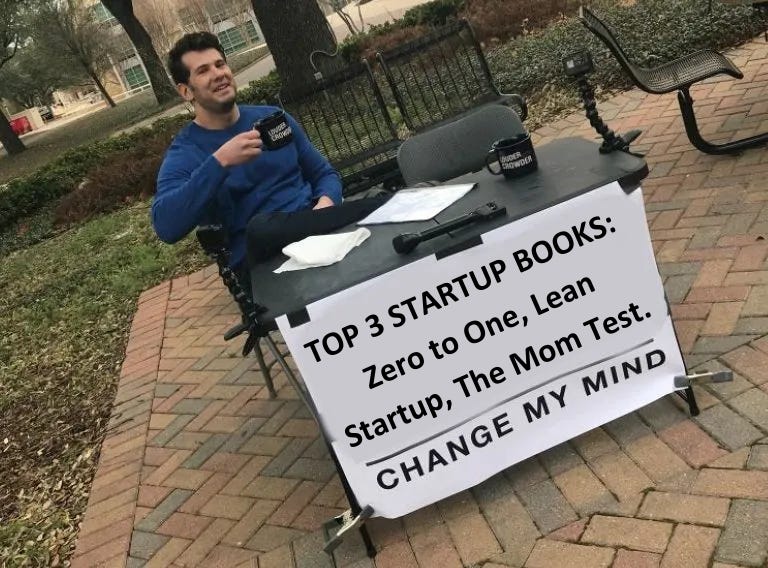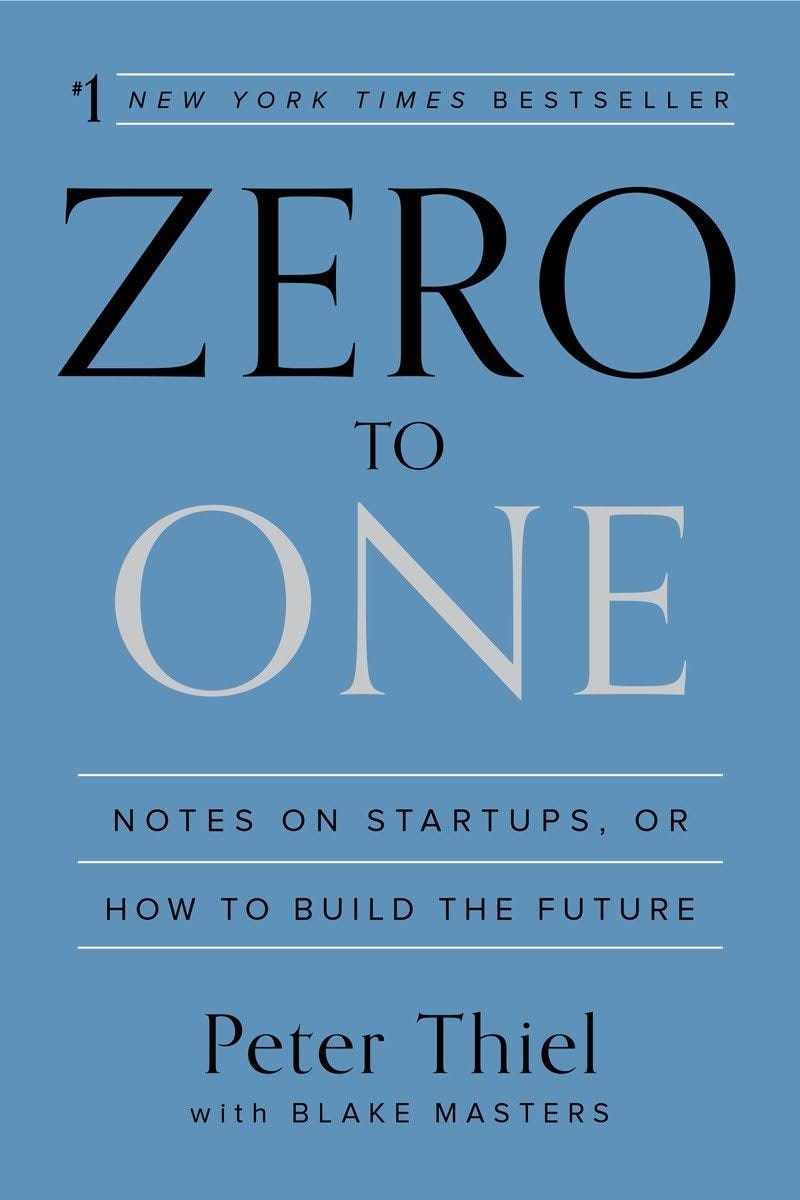Zero to One: Why Competing Is a Trap and What Great Founders Do Differently
This Friday->Zero to One: Notes on Startups, or How to Build the Future by Peter Thiel and Blake Masters [4 min reading]
On Startup Salad I break down a business book’s key takeaways in a simple, digestible format, just like a good salad!
Hey, it’s Fede!
Those books in the meme are must-reads for startup founders.
But the real question is: how many actually read them?
Entrepreneurs have a lot to do and not much time.
No worries, Fede thought about you.
As for The Mom Test, I already shared some takeaways (click here).
And today?
Let’s talk about another book legend: Zero to One.
Meant for anyone who wants to build the next big thing, it offers a mix of vision and practical advice.
Today's book: Zero to One: Notes on Startups, or How to Build the Future by Peter Thiel and Blake Masters
Pssst: Every time you see a 🥗, it means the takeaway is very hot!
Real Innovation Starts at Zero
We often talk about innovation, when in reality… we’re just improving something that already exists.
Peter Thiel, co-founder of PayPal and author of the book, spends a lot of time explaining this concept.
Going from iPhone 1 to iPhone 2 isn’t innovation.
It’s just an improvement of something that’s already there.
That’s going from 1 to 2, 3…n°.
But creating the first iPhone? 🥗
That’s 0 to 1.
Something entirely new.
Something that shifts the game, REAL INNOVATION.
And when you’re doing 0 to 1, Peter makes two things very clear:
You won’t be welcomed with open arms. 🥗
Real innovation feels strange at first.
If you’re working on something disruptive, expect resistance, not applause.You have to learn from the best innovators, but you can’t copy.
Learn from them, but trying to repeat what others did won’t work. What worked for them, at that time, in that market… isn’t what you need to do now.
And honestly, that’s the point.
If it feels too easy, too accepted, too comfortable…
It’s probably not 0 to 1, and it probably won’t create the next big thing.
Be Ready to Be Misunderstood
One last point from the book I really want to highlight:
being misunderstood.
Let’s be clear, Peter isn’t giving advice for building SMEs.
His thinking is meant for people who want to create big, world-changing things.
So yeah, it’s not for everyone.
But still… from what I’ve seen personally, and from what you read in most books, the common advice is:
”talk to people, share your idea, validate it.”
And yes, that’s often useful.
But here’s the thing:
If you’re working on something truly breakthrough, don’t expect everyone to get it. 🥗
Peter says it’s completely normal to feel misunderstood.
Because if everyone gets it right away… it’s probably not that bold.
And that’s okay.
Being misunderstood is part of building something that didn’t exist before.
Competition Kills Your Margins
This is my favorite part of the book.
Everyone in the startup world talks about USP (unique selling proposition), what makes you “better” than others, bla bla bla.
But Peter has a different take on it: 🥗
You’re not supposed to compete.
You should aim to become a MONOPOLY.
Sounds extreme?
Maybe. But hear this.
If you’re starting from scratch, of course you won’t monopolize a huge market from day one.
So what do you do?
You start with a very specific niche. 🥗
And in that niche, you don’t just beat the others, you make it look like you’re the only one.
On a bigger scale, Peter uses Google as an example.
For 25 years, they’ve been the default search engine. Sure, others exist. But based on numbers and perception? It’s a monopoly.
How to Build a Monopoly
So, how can you do it?
Here too, Peter is pretty clear:
There are many paths to monopoly.
But for tech startups, one rule stands out:
Take one thing of your startup, even something small, and do it 10x better than anyone else. 🥗
Not 2x.
Not 5x.
10x.
That’s how monopolies are born. That kind of leap doesn’t just make you competitive.
It puts you in a different league entirely.
And why this obsession with monopoly?
Simple: you need to escape competition.
Why?
Because competition kills margins, and margins are what make a business succeed.
In a world of perfect competition, no company would make any profits.
So don’t play the game.
Build your own monopoly.
That’s it for today, I hope you enjoyed it, BIG HUG.
The guidelines you need to build your startup:
See you next Friday,
Federico Lorenzon










Spoken by a true libertarian, Pieter Thiel unlocks hypergrowth. Sometimes. Let it not be an argument, however, for not bothering to explain your idea clearly. Otherwise you just become a frustrated genius.